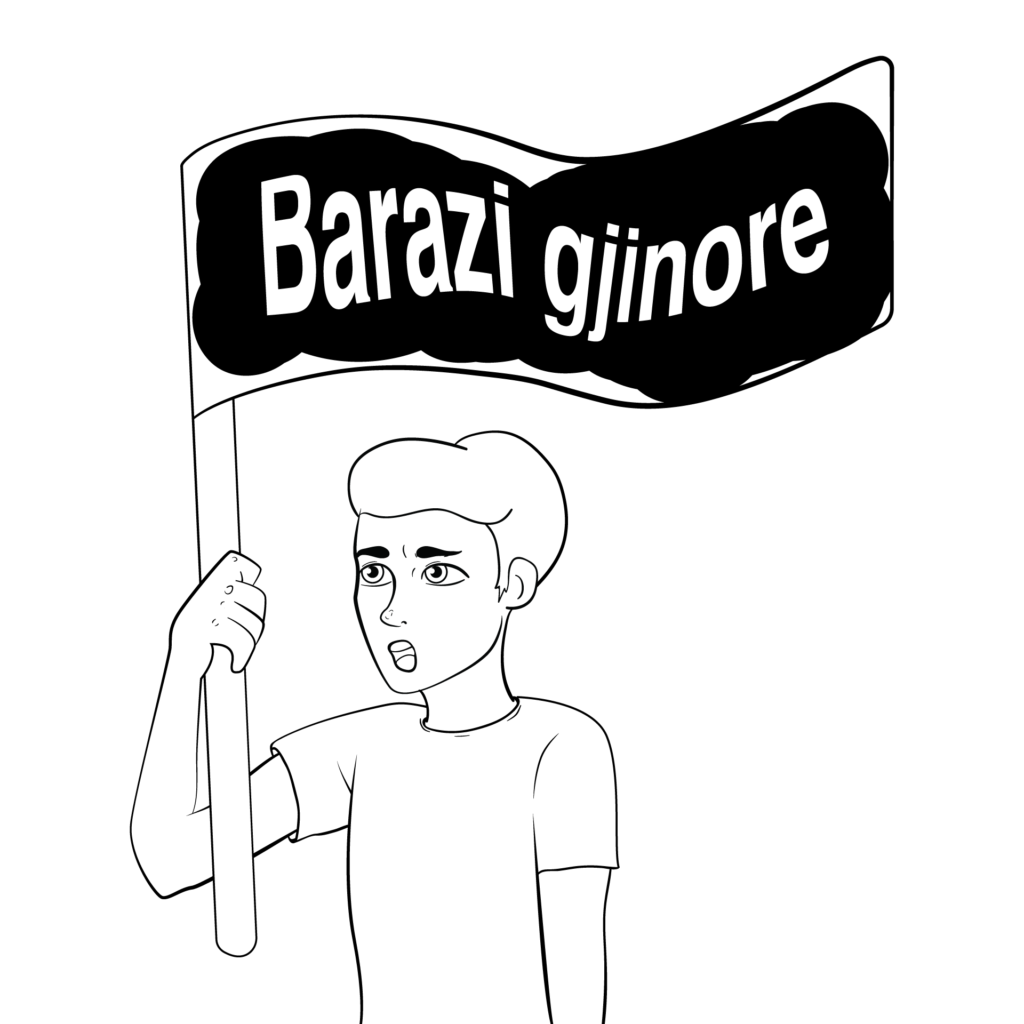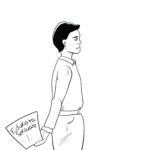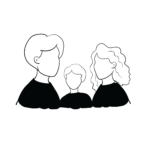THE IMPORTANCE OF MEN’S ACTIVISM IN THE BATTLE AGAINST GENDER DISCRIMINATION
In a society which faces multiple problems each day, and gender equality is not considered a priority, there will constantly be prejudice and stereotypes.
Illustration: Argjira Kukaj

In a democratic state it is normal for a man to raise his voice for women’s rights, but in Kosovo men’s activism for women’s rights differs. It can be said that men’s activism for this issue is very minimal and that men don’t raise their voice for girls and women. Gender equality remains a problem in Kosovar society.
But for there to be a society in which two genders to live freely and equally there should be a cooperation and common fight. Sociologists and activists consider that the man’s role is key and their activism must be present.
One of them is the activist for social justice Agon Rexhepi who attends studies in the high shcool “Ahmet Gashi” in Prishtina said that it is very important to include men in this fight.
“It is important for men to be included in this fight because it shouldn’t only be a women’s fight but also men and what men can do in this aspect is to have an impact in educating the family and for children to be raised in an same period of time”, said Rexhepi.
According to the main findings from international surveys on men and gender equality created in cooperation between Organization for Security and Co-operation in Europe’s (OSCE) Mission in Kosovo, the United Nations Population Fund (UNFPA) Kosovo office and “UBO Consulting” “childcare is primarily seen as a mother’s obligation by the social norms in Kosovo”. According to survey results 64% of women and 73 % of men either agree or partially agree that changing diapers, washing the children and feeding the children is the woman’s responsibility.
“This is also partially confirmed from childhood experiences of men in Kosovo, where 35% of them have had care primarily or only from their mother. A substantial part of them (59 percent) have reported that they received almost equal care from their mother and father, but that the father rarely undertakes this duty alone”, it is written on the report which gathers the survey findings.
For Besnik Leka who works in the organisation “CARE International Balkans” in the project “Initiative of Young Men”, inclusion of men regarding the field of gender equality is low in our country.
“Regarding the field of equality and gender equality inclusion of men has been at a very low level so as to not say that their inclusion has not existed in promoting equality and gender equity? But lately we see a bigger inclusion of men and young boys in promoting equality, taking responsibility, taking into account their awareness around patriarchy, which is impacting everyone and for that reason inclusion of everyone is more than necessary, and especially men who are themselves victims of a patriarchal society”, said Leka.
For the activist Nafije Kuqi who has dedicated her life to the cause for women’s emancipation, and has worked for The Kosova Rehabilitation Center for Torture Victims said that men’s impact on women’s emancipation and gender equality is very big.
“Looking at family life of a big part of society where the man has the primary role, then it is obvious that it has an impact. Urban families are more emancipated and the man’s role is not as big as in rural places and us as a society should put pressure for men’s emancipation”, said Kuqi, who was the first woman director of The Red Cross’s Prishtina branch. But it is still challenging to achieve men’s inclusion in this cause, where they would support women for an equal society.
“Society still doesn’t know the concept of equality and how an equal society is formed, because when you look at cases of family violence, gender discrimination and sexual harassment you understand that men are not ready and are not working in this aspect”, said Rexhepi.
According to a study published by “Youth Initiative for Human Rights” in Kosovo a woman’s salary is 12% lower than a man’s. And according to an article in Radio Free Europe/Radio Liberty based off Luljeta Demolli from “Kosovo Gender Studies Center” only 16 percent of property is in women’s deeds.
In a society which faces multiple problems each day, and gender equality is not considered a priority, there will constantly be prejudice and stereotypes.
According to Leka most of the problems have a base in stereotypes and prejudices.
“While we still live in a society and every day we see suffering and discrimination which in most cases have a base in stereotypes and prejudices from society. So, most of the problems have a root in stereotypes and prejudices, the way others see or in this case how society sees and positions girls and women, where in most cases society puts them in service of men and simultaneously violently plants inferiority in them”, he said.
On what brings an equal society to our country, there are different points of view from different people. In western European states where women have more rights than Kosovo women, there is a gigantic state development.
“Of course than gender equality is a very important aspect for our society and if we achieve this goal then we will have a progressive society, open toward Europe’s steps”, said Kuqi. But challenges are not small, whether it be for activists or civil society. According to Rexhepi in an equal society there has to be meritocracy. He says that the biggest challenge is people’s ignorance toward his fight for an equal society.
From all this it is clear that Kosovo society has a lot of problems and that battles to arrive at gender equality are numerous, but youth’s approach toward this problem gives hope that the situation can change. And for realizing these different goals for change, a commitment of everyone without distinction, is necessary.
About the author: Nol Musa is a 16 years old boy from Prishtina, a high school student who is also involved in activism.
This activity is supported by Engagement for Equity Program – E4E, financed by United States Agency for International Development – USAID, and implemented by Advocacy Training and
Resource Center –ATRC.


